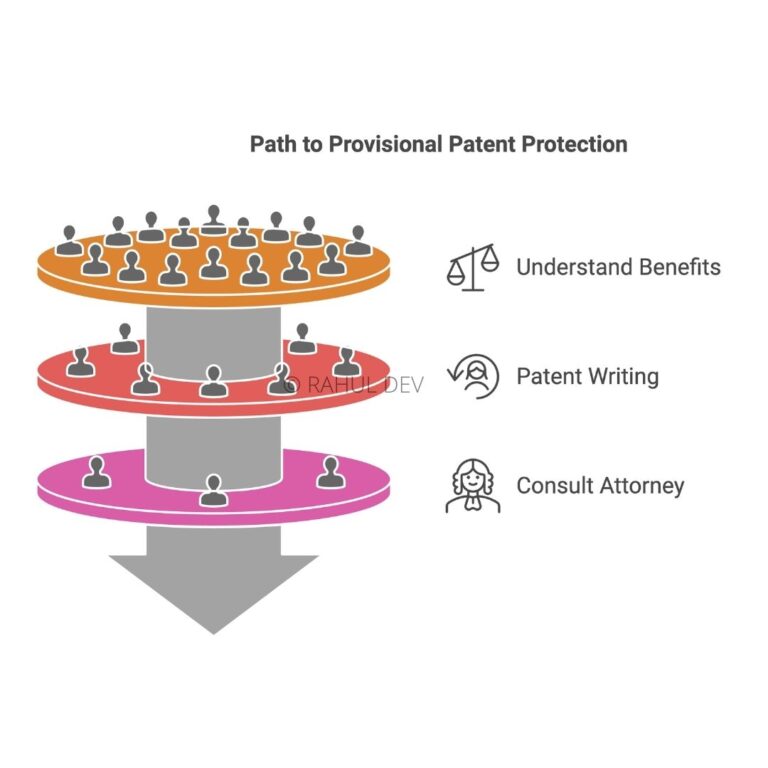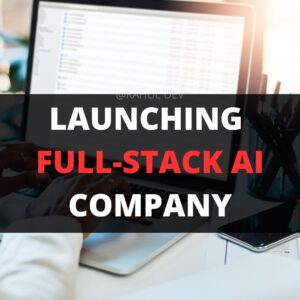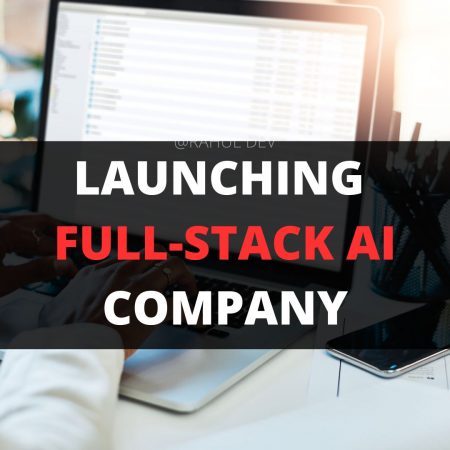Full Stack AI Projects
Insights by Dr. Rahul Dev

Understand Practical Aspects
Understand the process of launching full stack AI companies

Insights by Dr. Rahul Dev

Understand the process of launching full stack AI companies

Protect your innovations across multiple countries and create strong patent portfolio to boost business valuation
Local and global brand protection through international trademark registrations
Extensive research and business writing for technical whitepapers and B2B content products
Here I discuss why Full Stack AI companies pay 25x revenue multiples by building a strong full stack AI patent portfolio. The race to build full stack AI companies has transformed intellectual property from a defensive necessity into a valuation multiplier. A strategic approach to software patents, proprietary algorithms, and licensing agreements now determines whether startups achieve premium valuations or fade into obscurity.
The global patent valuation market has exploded to USD 1,424.32 million in 2025, reflecting the critical importance of intellectual property in the AI ecosystem. The companies that understand this shift are building full stack AI strategies that integrate machine learning frameworks, application layers, and defensive patent clusters into cohesive competitive moats. The result is clear: AI companies with robust IP strategies command average M&A revenue multiples of 25.8x, demonstrating the direct correlation between strategic patent development and valuation growth.
This article covers following topics:
Architecture of Full Stack AI Patent Strategy
Full Stack AI Patent Clusters for Competitive Advantage
Full Stack AI Tools for Patent Valuation
Real-World Success Stories from Global Full Stack AI Leaders


A full stack AI intellectual property strategy requires systematic protection across the entire technology stack. The approach begins with core machine learning frameworks and extends through specialized application layers, creating an integrated defense against competitors. The most successful companies file strong software patents that cover data training methodologies, neural network architectures, and user interface innovations simultaneously.
The digital patent landscape reveals striking patterns in global AI innovation. The Chinese market now accounts for over 70% of global AI patent filings, focusing primarily on generative AI and machine learning innovations. The American counterpart, led by companies like IBM with 12,092 AI patents, emphasizes foundational technologies and enterprise applications.
The geographic distribution of patents has become a strategic consideration for full stack AI companies seeking global market positioning.
The integration of AI-driven patent valuation tools has revolutionized how companies assess and build their portfolios. These platforms analyze licensing volumes, exclusivity terms, royalty rates, and litigation risks in real-time. The technology enables startups to identify high-value patent clusters and eliminate redundancies, optimizing R&D investments and acquisition targets. The automated valuation process transforms patent strategy from guesswork into data-driven decision-making.
The creation of defensive patent clusters represents a fundamental shift in how full stack AI companies approach intellectual property. The strategy involves filing related patents that cover interconnected aspects of AI technology, from proprietary algorithms to implementation methods. The clusters serve multiple purposes: deterring litigation, blocking competitors, and demonstrating technological depth to investors.
The most effective patent clusters address specific vertical applications while maintaining broad technological coverage.
A voice AI startup might cluster patents around speech recognition algorithms, natural language processing techniques, and user interface designs. The comprehensive approach creates multiple barriers to entry and establishes clear ownership of the technology stack. The strategy has proven particularly effective in attracting investment, as demonstrated by numerous funding rounds where patent clusters served as primary valuation drivers.
The role of strategic licensing agreements cannot be overstated in maximizing patent value. The agreements transform defensive assets into revenue generators while maintaining competitive positioning. The licensing strategy requires careful balance by monetizing innovations without empowering competitors. The most successful full stack AI companies use tiered licensing models that preserve core competitive advantages while generating predictable revenue streams.
The emergence of AI-powered valuation platforms has transformed intellectual property management for full stack AI startups. The tools provide continuous portfolio analysis, identifying value patterns across sectors and highlighting monetization opportunities. The platforms examine patent citations, market relevance, and competitive landscapes to generate real-time valuation metrics.
The blockchain integration into patent systems enhances transaction transparency and security, addressing long-standing concerns about IP ownership verification. The technology creates immutable records of patent transactions and licensing agreements, improving investor confidence. The combination of AI valuation and blockchain verification systems positions full stack AI companies to maximize patent portfolio value through enhanced credibility and streamlined transactions.
The practical application of these tools extends beyond valuation to strategic decision-making. The platforms enable scenario modeling that tests portfolio resilience under different market conditions. The analysis helps companies prioritize patent acquisitions, identify licensing opportunities, and optimize R&D investments. The data-driven approach replaces intuition with intelligence in IP strategy development.
The implementation of comprehensive IP strategies by industry leaders provides valuable blueprints for emerging full stack AI companies. The NVIDIA approach focuses on GPU compute methods and specialized AI acceleration technologies, creating an impenetrable moat around hardware-accelerated machine learning. The Baidu strategy emphasizes autonomous vehicle architectures and natural language processing, demonstrating the value of vertical integration in patent development.
The Tencent model showcases the power of strategic patent restructuring. The company’s use of automated valuation software in 2024 to reorganize their IP portfolio resulted in increased licensing revenue and improved investor confidence. The restructuring preceded a major acquisition announcement, illustrating how patent optimization directly impacts corporate valuation events.
The success patterns reveal common elements: comprehensive coverage across technology stacks, strategic geographic distribution, and aggressive monetization through licensing. The companies that excel combine proprietary algorithms protection with broader ecosystem patents, creating multilayered competitive advantages. The approach requires significant investment but delivers exponential returns through enhanced valuation multiples and market positioning.
The intellectual property landscape for full stack AI companies will continue evolving rapidly through 2025 and beyond. The patent valuation market’s projected growth to USD 3.5 billion by 2033 signals sustained importance of IP assets in technology valuations. The companies that build integrated strategies today position themselves for premium valuations tomorrow.
The convergence of AI innovation and strategic IP development creates unprecedented opportunities for startups. The availability of sophisticated valuation tools, combined with proven frameworks from industry leaders, provides clear pathways to success. The key lies in systematic execution by building patent clusters that protect core innovations while enabling strategic monetization through licensing agreements.
The transformation of intellectual property from cost centre to value driver represents a fundamental shift in full stack AI company building. The startups that embrace comprehensive IP strategies, leverage AI-driven valuation tools, and learn from global leaders will command the premium valuations that define market winners. The intellectual property foundation built today determines the valuation heights achievable tomorrow.

As a business coach and thought leader, I cannot emphasize enough the importance of innovation, new software patents, mobile apps, and patents for tech companies, startups, and entrepreneurs. The world is rapidly evolving, and staying ahead of the curve is vital for success. Embracing technological advancements such as blockchain and AI can unlock unprecedented opportunities, streamline operations, and propel businesses into the future with competitive valuation via intangible assets.
Click Here for AI Startup Valuation Guide.
For instance, blockchain technology can revolutionize supply chain management and secure data sharing wherein innovative business models are explained to the audience via technical whitepapers, while AI can automate and optimize decision-making processes. Mobile apps are no longer just a luxury; they have become essential tools for engaging customers and offering personalized experiences. Furthermore, securing digital innovation patents is crucial for protecting intellectual property, fostering innovation, and maintaining a competitive edge. By investing in these areas, businesses can position themselves as industry pioneers and pave the way for a prosperous future after thoroughly conducting the due diligence and reviewing the legal opinion letters, which in case of digital assets can assist in determining the tokens as utility assets or coins as utility tokens before listing the assets at an exchange.
Our team of advanced patent attorneys assists clients with patent searches, drafting patent applications, and patent (intellectual property) agreements, including licensing and non-disclosure agreements. Advocate Rahul Dev is a Patent Attorney & International Business Lawyer practicing Technology, Intellectual Property & Corporate Laws. He is reachable at rd (at) patentbusinesslawyer (dot) com & @rdpatentlawyer on Twitter.
Quoted in and contributed to 50+ national & international publications (Bloomberg, FirstPost, SwissInfo, Outlook Money, Yahoo News, Times of India, Economic Times, Business Standard, Quartz, Global Legal Post, International Bar Association, LawAsia, BioSpectrum Asia, Digital News Asia, e27, Leaders Speak, Entrepreneur India, VCCircle, AutoTech).
Regularly invited to speak at international & national platforms (conferences, TV channels, seminars, corporate trainings, government workshops) on technology, patents, business strategy, legal developments, leadership & management.
Working closely with patent attorneys along with international law firms with significant experience with lawyers in Asia Pacific providing services to clients in US and Europe. Flagship services include international patent and trademark filings, patent services in India and global patent consulting services.
Global Blockchain Lawyers (www.GlobalBlockchainLawyers.com) is a digital platform to discuss legal issues, latest technology and legal developments, and applicable laws in the dynamic field of Digital Currency, Blockchain, Bitcoin, Cryptocurrency and raising capital through the sale of tokens or coins (ICO or Initial Coin Offerings).
Blockchain ecosystem in India is evolving at a rapid pace and a proactive legal approach is required by blockchain lawyers in India to understand the complex nature of applicable laws and regulations.